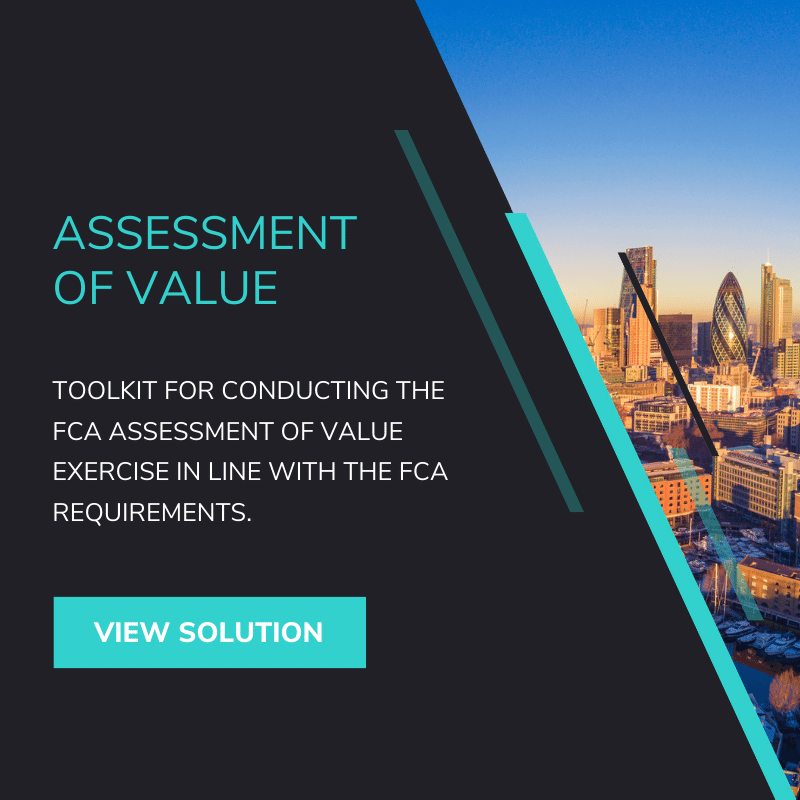Ouch! FCA delivers another blow to AFMs with Assessment of Value review
Last week the FCA published the results of their review on ‘host’ Authorised Fund Management firms’ which concluded with the FCA wanting to see “significant improvements” with many currently failing to meet the FCA standards.
This week, the FCA have issued their findings on the review of AFMs Assessment of Value reports. Unfortunately, this review does not provide any easier reading and delivers another huge blow to the industry.
FCA Review
Between July 2020 and May 2021, the FCA visited 18 firms to review their AoV processes. During the review, they interviewed staff and directors to understand their processes, the inputs they used and their governance structures.
Overall, the FCA found that:
- Most AFMs reviewed had not implemented AoV arrangements sufficient to comply with the rules
- AFMs often made assumptions that they could not justify
- Many firms did not properly apply some of the minimum considerations
- Some firms assessed value only at a fund level rather than by unit class
- When considering a fund’s performance, many firms did not consider what the fund should deliver given its investment policy, investment strategy and fees
- Independent directors on AFM Boards did not provide the robust challenge expected
Key Findings
Quality of service
Under the AoV rules, firms must consider, when assessing the value offered and whether fees and charges can be justified, the range and quality of services provided to investors.
During the review, the FCA observed some firms not considering the quality of the investment process as part of this consideration of quality of services. Instead, many firms judged the investment process through the lens of performance only.
Additionally, it was found that many firms considered the quality of service only at a firm level, rather than by fund and unit class. The requirements under COLL 6.6.20R(2) which requires a separate assessment for each unit class was a common theme throughout the FCA feedback.
Performance
In terms of the performance consideration, COLL 6.6.21R(2) requires that firms must consider the performance of the fund, after deduction of all payments out of scheme property as set out in the prospectus. Performance should be considered over an appropriate timescale having regard to the scheme’s investment objectives, policy and strategy.
When reviewing this consideration, the FCA found a few firms made the assessment based on “gross” performance of their funds, rather than net performance. Of the firms that did assess net performance, many only did so for one of the unit classes available, again, contrary to COLL 6.6.20R(2) and the requirements of separate assessment for each unit class.
Further feedback provided included:
- Fund performance assessed using measures that don’t reflect a fund’s investment policy and strategy
- Under-performance attributed to an undisclosed investment style
- Multi asset funds’ and funds of funds’ performance assessed against peers rather than the value they added
However, it wasn’t all doom and gloom for this consideration, the FCA found that a few firms had comprehensively reviewed their funds’ stated investment objectives and revised those for funds that were actively managed and used a comparator benchmark; they changed them from an absolute return, ‘capital growth’ objective to an objective of outperforming the comparator benchmark.
AFM Costs
In terms of AFM Costs, the Assessment of Value rules require firms to make an assessment in relation to each charge, the cost of providing the service to which the charge relates, and when money is paid directly to associates or external parties, the cost is the amount paid to that person.
Once again, some positives came out of the review, however, this positivity was concentrated to firms with overseas parents – more specifically those from US groups. These firms were found to have benefited from their parent companies previous experience with dealing with years of board disclosures required under section 15c of the US Investment Company Act.
More on 15c here:
However, although the FCA feedback started on a positive note, they also found many firms had incorrectly implemented this consideration, with some comparing total fund charges with those of competitors, rather than considering fees and charges incurred by investors in the context of costs incurred by the AFM in operating the fund.
Additionally, some firms used assumptions that the firms could not justify.
Economies of Scale
COLL 6.6.20R requires firms to consider whether the AFM is able to achieve savings and benefits from economies of scale, relating to the direct and indirect costs of managing the scheme property and taking into account the value of the scheme property and whether it has grown or contracted in size as a result of the sale and redemption of units.
In terms of this consideration, the FCA found that most firms acknowledged that economies of scale arise at both fund and firm level. However, some have made very little progress in developing a methodology for measuring them to date.
Comparable Market Rates
The comparable market rates consideration requires an assessment in relation to each service, the market rate for any comparable service provided:
- By the AFM; or
- The AFM or on its behalf, including by a person to which any aspect of the scheme’s management has been delegated.
The feedback on this consideration from the FCA was mixed – although they found that an assessment of comparable market rates was conducted by all participants, and it did result in several fees being cut as an outcome, there were instances of higher charging unit classes being excluded from the firms’ assessment.
Comparable Services
COLL 6.6.21R(6) considers comparable services and requires an assessment in relation to each separate charge, the AFM’s charges and those of its associates for comparable services provided to clients, including for institutional mandates of a comparable size and having similar investment objectives and policies.
The FCA review found that firm typically did not consider whether the additional fees paid by the authorised funds versus those paid by segregated mandates could be justified by the complexity of the additional service levels.
Additionally, some firms did not compare fund charges with those of segregated mandates, despite appearing to manage similar-sized mandates with similar investment objectives and policies.
Classes of units
The combination of COLL 6.6.20R/COLL 8.5.17R and COLL 6.6.21R(7) requires firms to justify fees at unit class level, taking into consideration whether it is appropriate for investors in one class to pay more than is charged by other classes with substantially similar rights.
Overall, the FCA found good progress in this area, with many firms using the AMMS remedy to switch investors in bulk to cheaper unit classes where there was no obvious reason why they should continue paying more to be in the existing class.
However, once again the FCA found this was another consideration where some firms did not implement the AoV rules correctly, with some firms checking whether investors were in the cheapest class given the size of their investment and the distribution channel used to sell the fund to them.
Quality of Reporting
Quality of reporting was one area the FCA’s feedback was relatively positive. As per COLL 4.5.7R(8) and COLL 8.3.5AR(5), firms are required to issue an annual report setting out a description of the assessment of value. This must include a separate discussion and conclusion for each of the minimum considerations, a conclusion on whether fund fees are justified in the context of overall value delivered, and an explanation of actions taken or to be taken, where this is not the case.
The FCA’s positive feedback in this area perhaps highlights the issue of the small sample size of only 18 firms used in the assessment and it contrary to what we have seen. During our review, we found that many firms required a deep dive into their website to locate the relevant AoV documents, whilst others opted to provide the statement hidden in the middle of an annual report.
Additionally, in terms of quality of reporting, we were surprised by the lack of feedback around readability and coherence. Effective communication to improve consumer choice and decision-making is something the FCA have aimed to achieve. Striking the right balance between an informative assessment and information overload certainly seems to have been a major challenge faced by many managers we reviewed.
Independent Directors’ Contribution
COLL 6.6.25R and COLL 8.5.20R require AFMs to appoint INEDs who are independent in character and judgement, and have sufficient expertise and experience to make judgements on whether the AFM is managing the fund in the best interests of unitholders. The role of the INED should include providing input and challenge as part of the AoV process. Firms should consider whether their INEDs are demonstrating these capabilities and behaviours.
Contrary to the above requirement, the FCA found that many of the INEDs did not have a good understanding of the AoV rules or of the role expected of them.
Next Steps
Each AFM Board should consider the review and they should apply it to the way the AFM conducts future value statements. Where necessary, the AFM should implement appropriate changes.
The FCA intend to conduct another review within the next 12 to 18 months and expect to find firms “complying fully” with the rules during the next review!
How we can help!
Our browser based FCA Assessment of Value Solution provides firms with a comprehensive and efficient toolkit for conducting the assessment of value exercise in line with the FCA requirements in a cost-efficient and streamlined way.
Our browser-based FCA Assessment of Value Solution makes complex review and reporting quick and easy, with interactive and customisable dashboards, enabling firms to access and share key data at the click of a button.
Key features include:
Product Governance
- Define the target market.
- Define the distribution strategy.
- Monitor against actual distribution.
Costs
- Monitor for availability of cheaper alternatives.
- Benchmark against market costs and passive alternatives.
- Trend analysis over time.
Performance
- Define appropriate performance criteria.
- Monitor against set performance.
Risk
- Define appropriate risk measures.
- Automate risk calculations.
Management
- Clear dashboard reports and analysis.
- Fund specific analysis.
- Comparisons across share classes.
- Comparisons across the market.
Closet Index Tracker Monitoring
- Active Management analysis.
- Monitoring composition and performance vs passive index trackers.
Annual Public Report
- Automated reporting to support the production of the annual statement.
Service Quality
- Asset service quality
Arrange A Demo
Error: Contact form not found.














